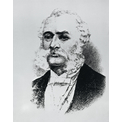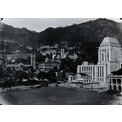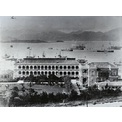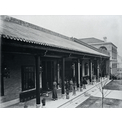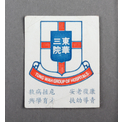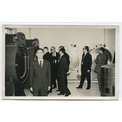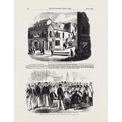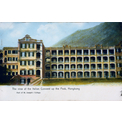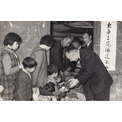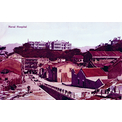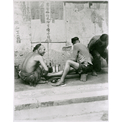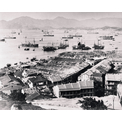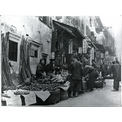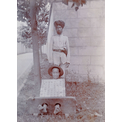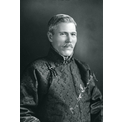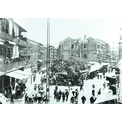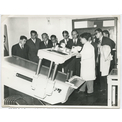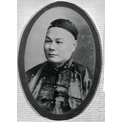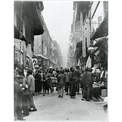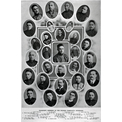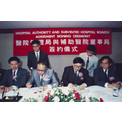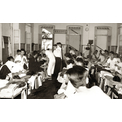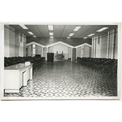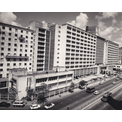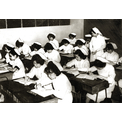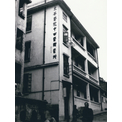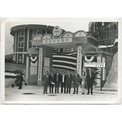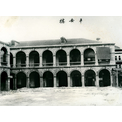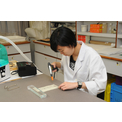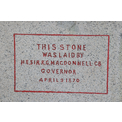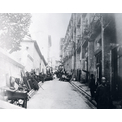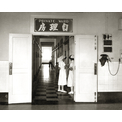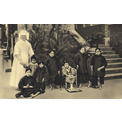 Collections
Collections Hong Kong, Benevolent City: Tung Wah and the Growth of Chinese Communities
Hong Kong, Benevolent City: Tung Wah and the Growth of Chinese Communities All Items
All Items Images
Images
Jinniu Shan Overseas Chinese Cemetery
About 1,500 tombs at Jinniu Shan Overseas Chinese Cemetery, located in Hezui in Huangchongkeng, Xinhui, Guangdong province. The tombs are believed to have been built during the tumultuous 1940s. While any main and memorial tombstones have not been found, the tomb of "god of the earth" was inscribed with the words "erected by Ren'an Hospital". Ren'an Hospital is a benevolent society-type fangbian yiyuan (shelter and clinic), where coffins are reposed. According to the archives of the Tung Wah Coffin Home, Ren'an was one of the collection points for coffins and urns of bones returning to Xinhui from overseas.
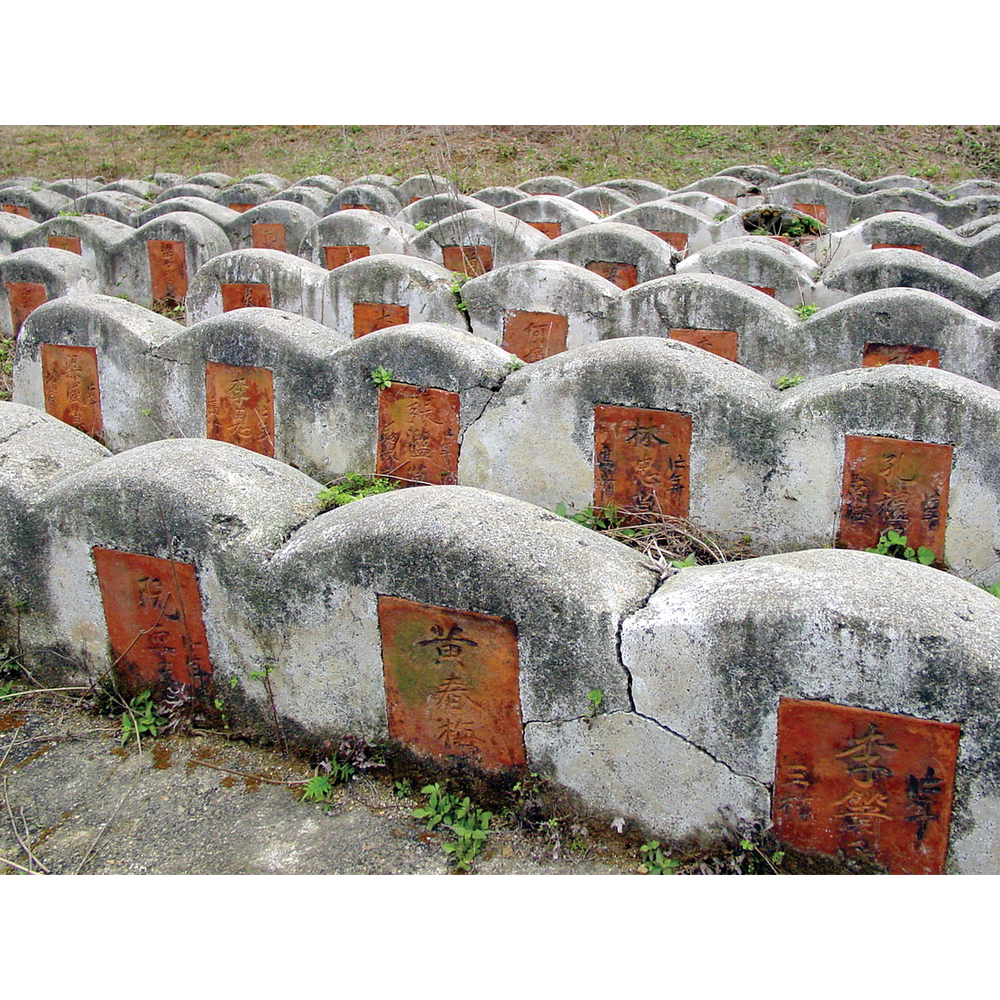
| Date | 2000s |
| Material Type | Image |
| Collection | Hong Kong, Benevolent City: Tung Wah and the Growth of Chinese Communities |
| Source | Courtesy of Ko Tim Keung |
| Repository | Ko Tim Keung |
| Note to Copyright | Permission for use in Hong Kong Memory is given by Ko Tim Keung |
| Accession No. | lcs-twgh-0118 |
Jinniu Shan Overseas Chinese Cemetery
About 1,500 tombs at Jinniu Shan Overseas Chinese Cemetery, located in Hezui in Huangchongkeng, Xinhui, Guangdong province. The tombs are believed to have been built during the tumultuous 1940s. While any main and memorial tombstones have not been found, the tomb of "god of the earth" was inscribed with the words "erected by Ren'an Hospital". Ren'an Hospital is a benevolent society-type fangbian yiyuan (shelter and clinic), where coffins are reposed. According to the archives of the Tung Wah Coffin Home, Ren'an was one of the collection points for coffins and urns of bones returning to Xinhui from overseas.
| Date | 2000s |
| Material Type | Image |
| Collection | Hong Kong, Benevolent City: Tung Wah and the Growth of Chinese Communities |
| Source | Courtesy of Ko Tim Keung |
| Repository | Ko Tim Keung |
| Note to Copyright | Permission for use in Hong Kong Memory is given by Ko Tim Keung |
| Accession No. | lcs-twgh-0118 |
Jinniu Shan Overseas Chinese Cemetery
About 1,500 tombs at Jinniu Shan Overseas Chinese Cemetery, located in Hezui in Huangchongkeng, Xinhui, Guangdong province. The tombs are believed to have been built during the tumultuous 1940s. While any main and memorial tombstones have not been found, the tomb of "god of the earth" was inscribed with the words "erected by Ren'an Hospital". Ren'an Hospital is a benevolent society-type fangbian yiyuan (shelter and clinic), where coffins are reposed. According to the archives of the Tung Wah Coffin Home, Ren'an was one of the collection points for coffins and urns of bones returning to Xinhui from overseas.
| Date | 2000s |
| Material Type | Image |
| Collection | Hong Kong, Benevolent City: Tung Wah and the Growth of Chinese Communities |
| Source | Courtesy of Ko Tim Keung |
| Repository | Ko Tim Keung |
| Note to Copyright | Permission for use in Hong Kong Memory is given by Ko Tim Keung |
| Accession No. | lcs-twgh-0118 |
Jinniu Shan Overseas Chinese Cemetery
About 1,500 tombs at Jinniu Shan Overseas Chinese Cemetery, located in Hezui in Huangchongkeng, Xinhui, Guangdong province. The tombs are believed to have been built during the tumultuous 1940s. While any main and memorial tombstones have not been found, the tomb of "god of the earth" was inscribed with the words "erected by Ren'an Hospital". Ren'an Hospital is a benevolent society-type fangbian yiyuan (shelter and clinic), where coffins are reposed. According to the archives of the Tung Wah Coffin Home, Ren'an was one of the collection points for coffins and urns of bones returning to Xinhui from overseas.
| Date | 2000s |
| Material Type | Image |
| Collection | Hong Kong, Benevolent City: Tung Wah and the Growth of Chinese Communities |
| Source | Courtesy of Ko Tim Keung |
| Repository | Ko Tim Keung |
| Note to Copyright | Permission for use in Hong Kong Memory is given by Ko Tim Keung |
| Accession No. | lcs-twgh-0118 |
Jinniu Shan Overseas Chinese Cemetery
About 1,500 tombs at Jinniu Shan Overseas Chinese Cemetery, located in Hezui in Huangchongkeng, Xinhui, Guangdong province. The tombs are believed to have been built during the tumultuous 1940s. While any main and memorial tombstones have not been found, the tomb of "god of the earth" was inscribed with the words "erected by Ren'an Hospital". Ren'an Hospital is a benevolent society-type fangbian yiyuan (shelter and clinic), where coffins are reposed. According to the archives of the Tung Wah Coffin Home, Ren'an was one of the collection points for coffins and urns of bones returning to Xinhui from overseas.
| Date | 2000s |
| Material Type | Image |
| Collection | Hong Kong, Benevolent City: Tung Wah and the Growth of Chinese Communities |
| Source | Courtesy of Ko Tim Keung |
| Repository | Ko Tim Keung |
| Note to Copyright | Permission for use in Hong Kong Memory is given by Ko Tim Keung |
| Accession No. | lcs-twgh-0118 |
Jinniu Shan Overseas Chinese Cemetery
About 1,500 tombs at Jinniu Shan Overseas Chinese Cemetery, located in Hezui in Huangchongkeng, Xinhui, Guangdong province. The tombs are believed to have been built during the tumultuous 1940s. While any main and memorial tombstones have not been found, the tomb of "god of the earth" was inscribed with the words "erected by Ren'an Hospital". Ren'an Hospital is a benevolent society-type fangbian yiyuan (shelter and clinic), where coffins are reposed. According to the archives of the Tung Wah Coffin Home, Ren'an was one of the collection points for coffins and urns of bones returning to Xinhui from overseas.
| Date | 2000s |
| Material Type | Image |
| Collection | Hong Kong, Benevolent City: Tung Wah and the Growth of Chinese Communities |
| Source | Courtesy of Ko Tim Keung |
| Repository | Ko Tim Keung |
| Note to Copyright | Permission for use in Hong Kong Memory is given by Ko Tim Keung |
| Accession No. | lcs-twgh-0118 |
Jinniu Shan Overseas Chinese Cemetery
About 1,500 tombs at Jinniu Shan Overseas Chinese Cemetery, located in Hezui in Huangchongkeng, Xinhui, Guangdong province. The tombs are believed to have been built during the tumultuous 1940s. While any main and memorial tombstones have not been found, the tomb of "god of the earth" was inscribed with the words "erected by Ren'an Hospital". Ren'an Hospital is a benevolent society-type fangbian yiyuan (shelter and clinic), where coffins are reposed. According to the archives of the Tung Wah Coffin Home, Ren'an was one of the collection points for coffins and urns of bones returning to Xinhui from overseas.
| Date | 2000s |
| Material Type | Image |
| Collection | Hong Kong, Benevolent City: Tung Wah and the Growth of Chinese Communities |
| Source | Courtesy of Ko Tim Keung |
| Repository | Ko Tim Keung |
| Note to Copyright | Permission for use in Hong Kong Memory is given by Ko Tim Keung |
| Accession No. | lcs-twgh-0118 |
Jinniu Shan Overseas Chinese Cemetery
About 1,500 tombs at Jinniu Shan Overseas Chinese Cemetery, located in Hezui in Huangchongkeng, Xinhui, Guangdong province. The tombs are believed to have been built during the tumultuous 1940s. While any main and memorial tombstones have not been found, the tomb of "god of the earth" was inscribed with the words "erected by Ren'an Hospital". Ren'an Hospital is a benevolent society-type fangbian yiyuan (shelter and clinic), where coffins are reposed. According to the archives of the Tung Wah Coffin Home, Ren'an was one of the collection points for coffins and urns of bones returning to Xinhui from overseas.
| Date of Death | 2000s |
| Material Type | Image |
| Collection | Hong Kong, Benevolent City: Tung Wah and the Growth of Chinese Communities |
| Source | Courtesy of Ko Tim Keung |
| Repository | Ko Tim Keung |
| Note to Copyright | Permission for use in Hong Kong Memory is given by Ko Tim Keung |
| Accession No. | lcs-twgh-0118 |
Jinniu Shan Overseas Chinese Cemetery
About 1,500 tombs at Jinniu Shan Overseas Chinese Cemetery, located in Hezui in Huangchongkeng, Xinhui, Guangdong province. The tombs are believed to have been built during the tumultuous 1940s. While any main and memorial tombstones have not been found, the tomb of "god of the earth" was inscribed with the words "erected by Ren'an Hospital". Ren'an Hospital is a benevolent society-type fangbian yiyuan (shelter and clinic), where coffins are reposed. According to the archives of the Tung Wah Coffin Home, Ren'an was one of the collection points for coffins and urns of bones returning to Xinhui from overseas.
| Date | 2000s |
| Material Type | Image |
| Collection | Hong Kong, Benevolent City: Tung Wah and the Growth of Chinese Communities |
| Source | Courtesy of Ko Tim Keung |
| Note to Copyright | Permission for use in Hong Kong Memory is given by Ko Tim Keung |
| Accession No. | lcs-twgh-0118 |
Jinniu Shan Overseas Chinese Cemetery
About 1,500 tombs at Jinniu Shan Overseas Chinese Cemetery, located in Hezui in Huangchongkeng, Xinhui, Guangdong province. The tombs are believed to have been built during the tumultuous 1940s. While any main and memorial tombstones have not been found, the tomb of "god of the earth" was inscribed with the words "erected by Ren'an Hospital". Ren'an Hospital is a benevolent society-type fangbian yiyuan (shelter and clinic), where coffins are reposed. According to the archives of the Tung Wah Coffin Home, Ren'an was one of the collection points for coffins and urns of bones returning to Xinhui from overseas.
| Date | 2000s |
| Material Type | Image |
| Collection | Hong Kong, Benevolent City: Tung Wah and the Growth of Chinese Communities |
| Source | Courtesy of Ko Tim Keung |
| Repository | Ko Tim Keung |
| Note to Copyright | Permission for use in Hong Kong Memory is given by Ko Tim Keung |
| Accession No. | lcs-twgh-0118 |
Jinniu Shan Overseas Chinese Cemetery
About 1,500 tombs at Jinniu Shan Overseas Chinese Cemetery, located in Hezui in Huangchongkeng, Xinhui, Guangdong province. The tombs are believed to have been built during the tumultuous 1940s. While any main and memorial tombstones have not been found, the tomb of "god of the earth" was inscribed with the words "erected by Ren'an Hospital". Ren'an Hospital is a benevolent society-type fangbian yiyuan (shelter and clinic), where coffins are reposed. According to the archives of the Tung Wah Coffin Home, Ren'an was one of the collection points for coffins and urns of bones returning to Xinhui from overseas.
| Date | 2000s |
| Material Type | Image |
| Collection | Hong Kong, Benevolent City: Tung Wah and the Growth of Chinese Communities |
| Source | Courtesy of Ko Tim Keung |
| Repository | Ko Tim Keung |
| Note to Copyright | Permission for use in Hong Kong Memory is given by Ko Tim Keung |
| Accession No. | lcs-twgh-0118 |
Jinniu Shan Overseas Chinese Cemetery
About 1,500 tombs at Jinniu Shan Overseas Chinese Cemetery, located in Hezui in Huangchongkeng, Xinhui, Guangdong province. The tombs are believed to have been built during the tumultuous 1940s. While any main and memorial tombstones have not been found, the tomb of "god of the earth" was inscribed with the words "erected by Ren'an Hospital". Ren'an Hospital is a benevolent society-type fangbian yiyuan (shelter and clinic), where coffins are reposed. According to the archives of the Tung Wah Coffin Home, Ren'an was one of the collection points for coffins and urns of bones returning to Xinhui from overseas.
| Date | 2000s |
| Material Type | Image |
| Collection | Hong Kong, Benevolent City: Tung Wah and the Growth of Chinese Communities |
| Source | Courtesy of Ko Tim Keung |
| Repository | Ko Tim Keung |
| Note to Copyright | Permission for use in Hong Kong Memory is given by Ko Tim Keung |
| Accession No. | lcs-twgh-0118 |
Jinniu Shan Overseas Chinese Cemetery
About 1,500 tombs at Jinniu Shan Overseas Chinese Cemetery, located in Hezui in Huangchongkeng, Xinhui, Guangdong province. The tombs are believed to have been built during the tumultuous 1940s. While any main and memorial tombstones have not been found, the tomb of "god of the earth" was inscribed with the words "erected by Ren'an Hospital". Ren'an Hospital is a benevolent society-type fangbian yiyuan (shelter and clinic), where coffins are reposed. According to the archives of the Tung Wah Coffin Home, Ren'an was one of the collection points for coffins and urns of bones returning to Xinhui from overseas.
| Date | 2000s |
| Material Type | Image |
| Collection | Hong Kong, Benevolent City: Tung Wah and the Growth of Chinese Communities |
| Source | Courtesy of Ko Tim Keung |
| Repository | Ko Tim Keung |
| Note to Copyright | Permission for use in Hong Kong Memory is given by Ko Tim Keung |
| Accession No. | lcs-twgh-0118 |
Jinniu Shan Overseas Chinese Cemetery
About 1,500 tombs at Jinniu Shan Overseas Chinese Cemetery, located in Hezui in Huangchongkeng, Xinhui, Guangdong province. The tombs are believed to have been built during the tumultuous 1940s. While any main and memorial tombstones have not been found, the tomb of "god of the earth" was inscribed with the words "erected by Ren'an Hospital". Ren'an Hospital is a benevolent society-type fangbian yiyuan (shelter and clinic), where coffins are reposed. According to the archives of the Tung Wah Coffin Home, Ren'an was one of the collection points for coffins and urns of bones returning to Xinhui from overseas.
| Date | 2000s |
| Material Type | Image |
| Collection | Hong Kong, Benevolent City: Tung Wah and the Growth of Chinese Communities |
| Source | Courtesy of Ko Tim Keung |
| Repository | Ko Tim Keung |
| Note to Copyright | Permission for use in Hong Kong Memory is given by Ko Tim Keung |
| Accession No. | lcs-twgh-0118 |
Jinniu Shan Overseas Chinese Cemetery
About 1,500 tombs at Jinniu Shan Overseas Chinese Cemetery, located in Hezui in Huangchongkeng, Xinhui, Guangdong province. The tombs are believed to have been built during the tumultuous 1940s. While any main and memorial tombstones have not been found, the tomb of "god of the earth" was inscribed with the words "erected by Ren'an Hospital". Ren'an Hospital is a benevolent society-type fangbian yiyuan (shelter and clinic), where coffins are reposed. According to the archives of the Tung Wah Coffin Home, Ren'an was one of the collection points for coffins and urns of bones returning to Xinhui from overseas.
| Date | 2000s |
| Material Type | Image |
| Collection | Hong Kong, Benevolent City: Tung Wah and the Growth of Chinese Communities |
| Source | Courtesy of Ko Tim Keung |
| Repository | Ko Tim Keung |
| Note to Copyright | Permission for use in Hong Kong Memory is given by Ko Tim Keung |
| Accession No. | lcs-twgh-0118 |
Jinniu Shan Overseas Chinese Cemetery
About 1,500 tombs at Jinniu Shan Overseas Chinese Cemetery, located in Hezui in Huangchongkeng, Xinhui, Guangdong province. The tombs are believed to have been built during the tumultuous 1940s. While any main and memorial tombstones have not been found, the tomb of "god of the earth" was inscribed with the words "erected by Ren'an Hospital". Ren'an Hospital is a benevolent society-type fangbian yiyuan (shelter and clinic), where coffins are reposed. According to the archives of the Tung Wah Coffin Home, Ren'an was one of the collection points for coffins and urns of bones returning to Xinhui from overseas.
| Date | 2000s |
| Material Type | Image |
| Collection | Hong Kong, Benevolent City: Tung Wah and the Growth of Chinese Communities |
| Source | Courtesy of Ko Tim Keung |
| Repository | Ko Tim Keung |
| Note to Copyright | Permission for use in Hong Kong Memory is given by Ko Tim Keung |
| Accession No. | lcs-twgh-0118 |
Jinniu Shan Overseas Chinese Cemetery
About 1,500 tombs at Jinniu Shan Overseas Chinese Cemetery, located in Hezui in Huangchongkeng, Xinhui, Guangdong province. The tombs are believed to have been built during the tumultuous 1940s. While any main and memorial tombstones have not been found, the tomb of "god of the earth" was inscribed with the words "erected by Ren'an Hospital". Ren'an Hospital is a benevolent society-type fangbian yiyuan (shelter and clinic), where coffins are reposed. According to the archives of the Tung Wah Coffin Home, Ren'an was one of the collection points for coffins and urns of bones returning to Xinhui from overseas.
| Date | 2000s |
| Material Type | Image |
| Collection | Hong Kong, Benevolent City: Tung Wah and the Growth of Chinese Communities |
| Source | Courtesy of Ko Tim Keung |
| Repository | Ko Tim Keung |
| Note to Copyright | Permission for use in Hong Kong Memory is given by Ko Tim Keung |
| Accession No. | lcs-twgh-0118 |
Jinniu Shan Overseas Chinese Cemetery
About 1,500 tombs at Jinniu Shan Overseas Chinese Cemetery, located in Hezui in Huangchongkeng, Xinhui, Guangdong province. The tombs are believed to have been built during the tumultuous 1940s. While any main and memorial tombstones have not been found, the tomb of "god of the earth" was inscribed with the words "erected by Ren'an Hospital". Ren'an Hospital is a benevolent society-type fangbian yiyuan (shelter and clinic), where coffins are reposed. According to the archives of the Tung Wah Coffin Home, Ren'an was one of the collection points for coffins and urns of bones returning to Xinhui from overseas.
| Date | 2000s |
| Material Type | Image |
| Collection | Hong Kong, Benevolent City: Tung Wah and the Growth of Chinese Communities |
| Source | Courtesy of Ko Tim Keung |
| Repository | Ko Tim Keung |
| Note to Copyright | Permission for use in Hong Kong Memory is given by Ko Tim Keung |
| Accession No. | lcs-twgh-0118 |
Copyright © 2012 Hong Kong Memory
